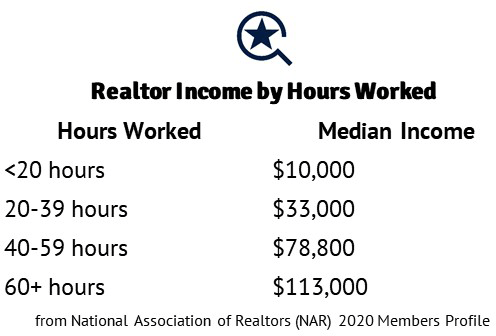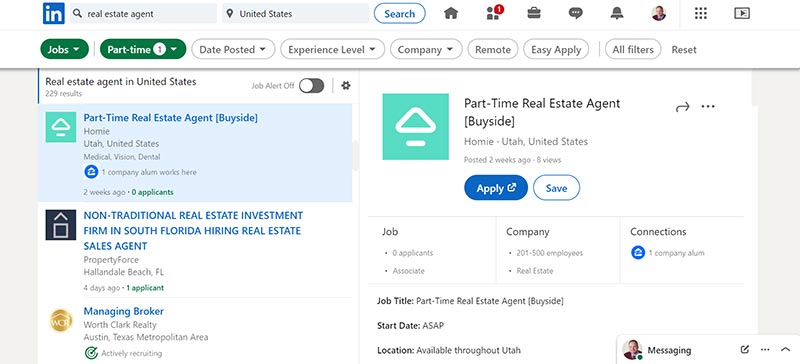Part-Time Real Estate Agent Tips for Success
- My Personal Part-Time Experience
- The Median Part-Time Real Estate Agent Makes $10,000
- The Part-Time Strategies
- How to Overcome the Challenges of Part-Time
- Salaried Part-Time Real Estate Jobs
- Resources for Succeeding as a Part Time Agent
- Conclusion
My Personal Part-Time Experience
I got my license in 2013 while still in the Army. I spent over year as a part-time real estate agent during which I did 6 deals.
In 2015, I transitioned to full-time and did 12 deals. By 2017 I hit 36 deals a year for a $7M volume and over $230k gross commission.
Being part-time was very challenging for me, even with a relatively undemanding role at the time. There just weren’t enough hours in the day for my day job and to do everything I needed to on real estate, prospecting etc.
That said, I couldn’t have done it any other way. Had I gone straight into real estate without doing it part-time, I would have gone broke. Even 12 deals a year was not enough to support my family. Getting a head start on the education and experience while still having the stability of a “real” job was invaluable and the difference between my making it and failing.
That’s why I don’t look down on part-time agents like some do. I think it is a great idea for most situations, especially if you are a breadwinner who has bills and a family to support. Honestly, I probably didn’t do part-time long enough.
Why You Should Consisder Part-Time
Obviously being a full-time agent is preferable if you can swing it. You will be more professional, more experienced, and more attentive of your real estate business.
I recommend having a 2-year runway before jumping into real estate sales. You should have enough money to live on for two years without earning a dime from real estate. If you have those kinds of resources or have a spouse who pays the bills, commit to full-time.
But if you don’t have the means to last two years without a paycheck and have financial responsibilities, I recommend considering part-time.
While there are lots of stories of rookie agents doing six figures in their first year, don’t count on it. The real estate industry sales cycle is notoriously long. It’s not like selling an iPhone where a transaction can take minutes. Leads you generate today may not translate into a commission check for another year or more.
How Much Can a Part-Time Agent Make?
According to the 2020 National Association of Realtors (NAR) Member Profile, 15% of real estate agents work 20 or fewer hours per week with a median gross income of $10,000.

$10,000 is not a lot of money, even for a part-time real estate agent salary. It’s especially small for the amount of work it takes to earn it. And that probably doesn’t sufficiently account for the kinds of expenses even part-time agents will incur like MLS fees, CRMs, or a website.
According to the same NAR survey, 5% of agents working less than 20 hours a week make over $100,000. But the survey doesn’t differentiate between new and established agents, and I suspect it is likely that these agents are more likely experienced agents working referrals and past customers but semi-retired. It’s likely extremely rare that a part-time and new agent makes six figures.
Reasons to Work Part-Time and the Strategies for Each
The annual cost of being a real estate agent is not insignificant. There are NAR dues, MLS fees, brokerage splits, and basic software you’ll need like e-signature software and a CRM. You need to do a few deals a year just to break even.
Permanent Part-Time for Extra Cash
Maybe you love your day job and don’t intend on leaving it at all! You’re just looking at real estate as a side hustle to earn some chunky real estate commissions. A single commission can be $10,000 or more!
I would beware if this is why you are considering part-time. Even a single real estate transaction can be demanding. In this market, it’s not uncommon to work with a single buyer for months or a year, making offers, losing in multiple offer situations, and then a demanding transaction with short option periods that doesn’t care about your day job schedule. You will likely suffer a lot of disruption both to your normal job and your personal life if you want to achieve an ROI on your time and money spent.
Stategies
- Partner Up. Consider focusing on just one aspect of the real estate transaction and provide that in partnership with another agent. Maybe it is the lead generation like managing Facebook ads, blogging, and direct mail. You can do that easily in evenings while your full-time associate does the client-facing stuff like showings, inspections, and closings.
Semi-Retired Looking to Stay Busy
A lot of part-time agents are embarking on a second career after retirement (the median Realtor age is 55 years old).
If you’re earning a pension and interested in real estate, you are in a great position to embark on a real estate career. You have a long runway where you don’t absolutely need to earn anything, more flexibility to make mistakes, and maybe even a little money to spend to grow your business faster.
But if you think it will be a “part-time” job, then I’d urge caution. You’ll want to consider whether you are comfortable with the unforgiving real estate agent schedule. It’s very difficult to take vacations and completely check out of being a real estate agent and still be successful.
Maybe it doesn’t matter if your lead generation is elite if you are happy with just the occasional deal, but even with a few clients a year you’re likely going to have something to do nearly every day, anyway. It will feel a lot like a full-time job whether you’re spending 20 or 40 hours a week.
Strategies
- Join a brokerage with relocation leads. If you’re committed to part-time because you want the flexibility to step in and out of the business and still enjoy life, it may be useful to join a brokerage that hands out leads, especially relocation leads. You don’t have to worry about 24/7 lead generation. The downside is you will have a much smaller split of the commission and some brokerages may not be willing to include part-time agents in their lead distribution.
Getting Your Feet Wet Before the Jump
Are you sick of your job and allured by the prospect of six-figure earning potential, owning your own business, and with almost non-existent barriers to entry?
Unfortunately, it is not an easy transition. Nearly 80% of agents fall out of the business within the first two years.
Instead of jumping into so uncertain a future, it makes a lot of sense to take it for a test drive first and see how well your talents match the skills required to be an agent. Moonlight as an agent and then make the plunge when you’re ready.
Strategy
- Replace Your Full-Time Income and Jump. Maybe you do a feel deals, enjoy it, and give your two-week notice. But if you are relying on real estate to pay your mortgage and provide for a family, I recommend waiting until you’ve replaced your current income. Real estate is extremely turbulent, with high highs and low lows. In my best year ever, I did 8 closings in a single month, and then didn’t get another paycheck for the next three months.
Working in Related Business and Want to Use Your License
Investors, property managers, lenders, and others who are already in the business often find themselves tempted to practice real estate part-time. For example, many investors see benefits to getting licensed to list their own homes and MLS access. Why not help a few friends buy or sell their home, too?
Be sure your licensed part-time activity does not have a conflict of interest with your day job. For example, offering to buy or list a home can be prickly when considering you have a fiduciary obligation to clients, but are acting in your own interests as an investor.
Overcoming Challenges of Being a Part-Time Agent
- Availability. You will find that you don’t make your own schedule as a real estate agent. Buyer showings, inspections, closings, listing presentations – all of these are done on the buyers’ and sellers’ schedules, not yours. Managing to attend all these events while holding a day job can be difficult if your primary job is not flexible. You need solid time management skills and may have to set limits with buyers and sellers that your availability. Perhaps you are only “open” for business on weekends and after hours. You may find it necessary to use paid time-off to accommodate events like inspections and closings.
- Employer Concerns. Your full-time job may not allow moonlighting as a real estate agent. Be sure you have checked with your employment contract to verify whether it is allowed and if you need to disclose anything to your manager prior to practicing real estate on the side.
- Broker Concerns. Not every real estate brokerage will accept part-time agents. Most, however, understand the transition into real estate can be an uncertain one and are open to it. They may want to understand your plan and the milestones you need to hit to justify transitioning to real estate full-time. Part-time agents are notoriously difficult to manage, often miss brokerage meetings, etc.
- Working as a Team. It’s possible that you won’t be able to accommodate the demanding real estate schedule with a full-time job. You may find it necessary to partner with another agent in your office, your licensed spouse, or even a formal team to help work with buyers and sellers as a team.
- Amassing Experience and Education. At 20 or fewer hours a week, you are not going to accumulate the experience and wisdom as fully dedicated agents. The result can be costly mistakes like bungled transactions or frustrated clients. Supercharging your expertise is critical. I recommend getting the GRI designation as an agent, especially as a part-time agent. It will teach you the ins and outs that you didn’t learn from your license courses, and will put you on an equal footing with your full-time peers. Get engaged in your local MLS or association. Attend the convention. Anything to go the extra mile to make up for reduced hours in the business.
Salaried Part-Time Real Estate Agent Jobs

Yet another option for your real estate license is a salaried part-time role.
Who hires part time agents?
Some limited listing service companies may hire agents to show one-off homes or do other fieldwork for them occasionally.
Other companies may hire local agents to complete a comparative market analysis (CMA) for investments or other operations. For example, Zillow is hiring part-time remote roles for licensed market analysis specialists.
There are also likely roles for part-time real estate assistants. Many teams who are leveling up can’t yet afford a 40-hour assistant.
Resources
The goal of my site at Hooquest is to set up agents for success. Whether that is selecting the best products or learning about best practices, I hope you’ll find I have some excellent resources here, pointing you in the right direction.
New Agent Starter Guide
I’ve written about some of the best resources like books, conferences, Twitter experts, and Facebook groups you’ll want to join as an agent.
I’ve also written a few articles below aimed at the new real estate agent. This should be highly actionable for the part-time agent as well!
- Every Real Estate Software Tool you Need Getting Started
- 23 Things New Real Estate Agents Waste Money On
- New Real Estate Agent Success Checklist
Podcasts for Part-Time Agents
- 952: Close One Deal per Week as a Part-Time Real Estate Agent with Garrett Maroon
- 98 – Part Time Real Estate Agent Tips and Tricks
Conclusion
Part-timers are often looked down on by real estate industry professionals. They feel that part-time agents dilute the Realtor brand, are less competent, and give the public a bad impression of the professionalism of agents.
While part-time is almost never ideal, the reality is that some part-timers are just as capable as some full-time agents, and may find limited work hours or alternate full-time employment necessary while getting their business up and running. If you’re committed and working hard at being a capable agent,


